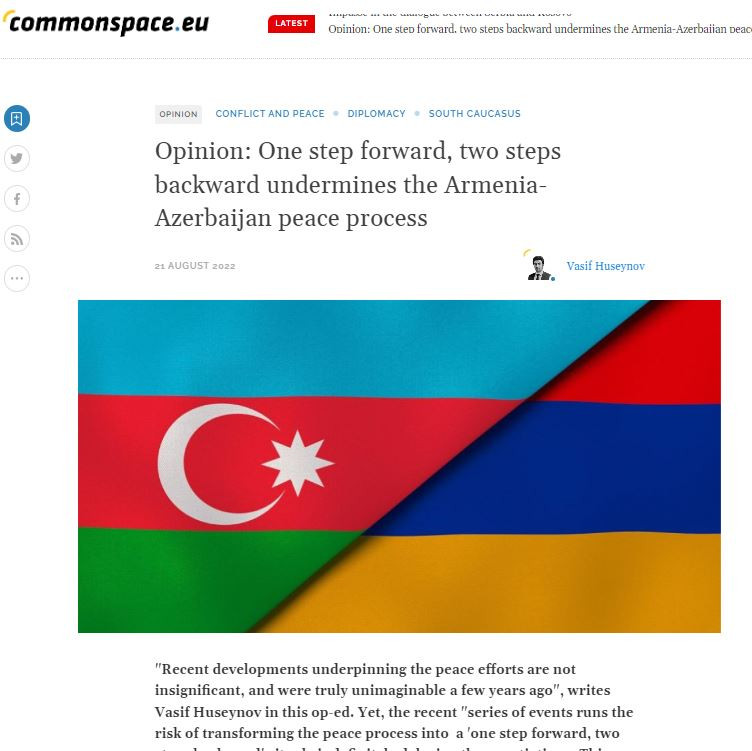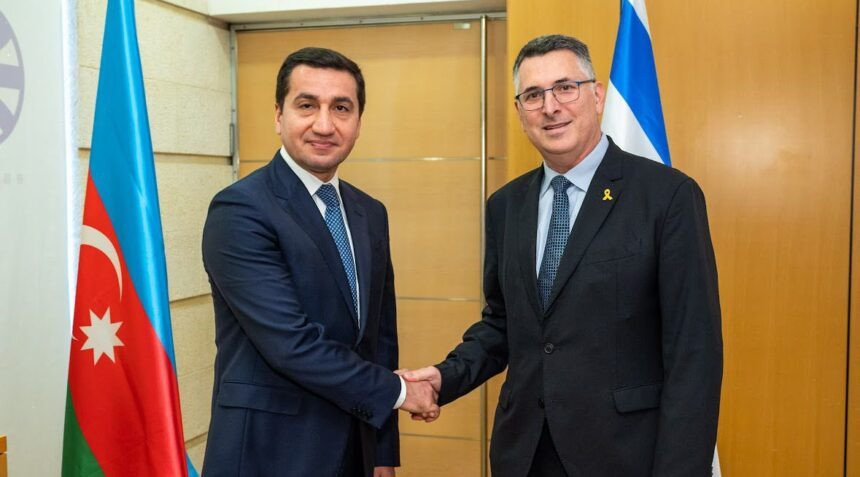"Recent developments underpinning the peace efforts are not insignificant, and were truly unimaginable a few years ago", writes Vasif Huseynov in this op-ed. Yet, the recent "series of events runs the risk of transforming the peace process into a 'one step forward, two steps backward' ritual, indefinitely delaying the negotiations. This trend should be countered by all means possible. It needs to be seriously taken into account by the European Union whilst exercising its efforts to bring the leaders of Armenia and Azerbaijan to the negotiating table", he adds.
On August 19, Toivo Klaar, the European Union’s special representative for the South Caucasus, hosted a trilateral meeting with Hikmet Hajiyev, foreign policy advisor to President Ilham Aliyev of Azerbaijan, and Armen Grigoryan, Secretary of the Security Council of Armenia. The meeting, which, according to Mr. Klaar, included “good and substantive discussions”, is expected to serve as a preparatory step before the fourth round of the EU-mediated summits of the leaders of the two South Caucasian republics. This came on the heels of a number of important developments over the last few weeks. Although some positive moments were noted in this period unfortunately there were also developments that challenged the peace and reconciliation efforts between the two countries.
It should be stressed that the recent developments underpinning the peace efforts are not insignificant and were truly unimaginable a few years ago. Armenia’s official decision to finally withdraw its armed forces from the territories of Azerbaijan, its plan to build three checkpoints along the border with Azerbaijan, the launch of the construction of the Armenian side of the new “Lachin corridor”, Prime Minister Pashinyan’s reaffirmation of Armenia’s readiness to provide land passage for a highway between the Western parts of Azerbaijan and Nakhchivan, etc. are all in line with the implementation course of the trilateral statement of November 10, 2020, and hence positively contribute to the process.
To the detriment of regional peace and security, the above-mentioned developments are, however, often accompanied by other developments that question the true agenda of the Armenian side, bring back the rhetoric of the period before the Second Karabakh War , and further deepen the wounds of the conflict.
First and foremost, one major challenge that still undermines the peace agenda is related to the Armenian armed forces in the territories of Azerbaijan. In mid-July, the Armenian government, countering their earlier statements claiming the opposite, admitted the presence of troops of Armenia in Karabakh, and pledged to withdraw them. However, the fact that the local Armenian separatists in Karabakh are armed, and Armenia supports them, continues to be a threat to regional stability. In early August, a clash between these forces and the Azerbaijani side resulted in the loss of military servicemen on both sides. This confrontation has once again confirmed that guns will not fall silent in Karabakh unless the separatist regime is fully demilitarized.
The stance of the Armenian government on this process further complicates the situation. Outraging the Azerbaijani side, Prime Minister Pashinyan, amidst the August clashes, said Azerbaijan should recognize “Nagorno-Karabakh” as a separate entity, and that it should accept the existence of a new “line of contact” in Karabakh. This revives the secessionist rhetoric of the Armenian side that sought to ensure the separation of the Karabakh region from the sovereignty of Azerbaijan and establish it as an independent entity. These claims for independence are not only a violation of international law but also contradict the earlier statements of Prime Minister Pashinyan who had admitted that the Karabakh region is recognized as belonging to Azerbaijan in international documents.
Another blow to the peace efforts was dealt by Armenian residents of Lachin town and two villages of the district which will return to the control of Azerbaijan as these territories are located on the former route of “Lachin corridor” which soon will be replaced with a new one. Encouraged by the Armenian Diaspora, these people set fire to their houses in Lachin before leaving the region. The scenes shared on social media from the fires are shocking for the Azerbaijani viewers and rub salt in the wounds created by the destruction of hundreds of settlements in the formerly-occupied territories and the plundering of their wealth during the thirty years they were under Armenian control.
Azerbaijan also discovered hundreds of new landmines planted in this region after the Second Karabakh War. Since the end of the war, more than 240 of Azerbaijani citizens died or had life-changing injuries due to mine explosions in Karabakh. Armenia continues to ignore the fact that every fatal mine explosion in this region is a shot also against the peace efforts. The planting of new anti-personal landmines in the region, therefore, casts doubts on the pacifistic statements of the Armenian leaders and questions the true intentions and objectives of their policies.
This series of events runs the risk of transforming the peace process into a “one step forward, two steps backward” ritual, indefinitely delaying the negotiations. This trend should be countered by all means possible. It needs to be seriously taken into account by the European Union whilst exercising its efforts to bring the leaders of Armenia and Azerbaijan to the negotiating table.








